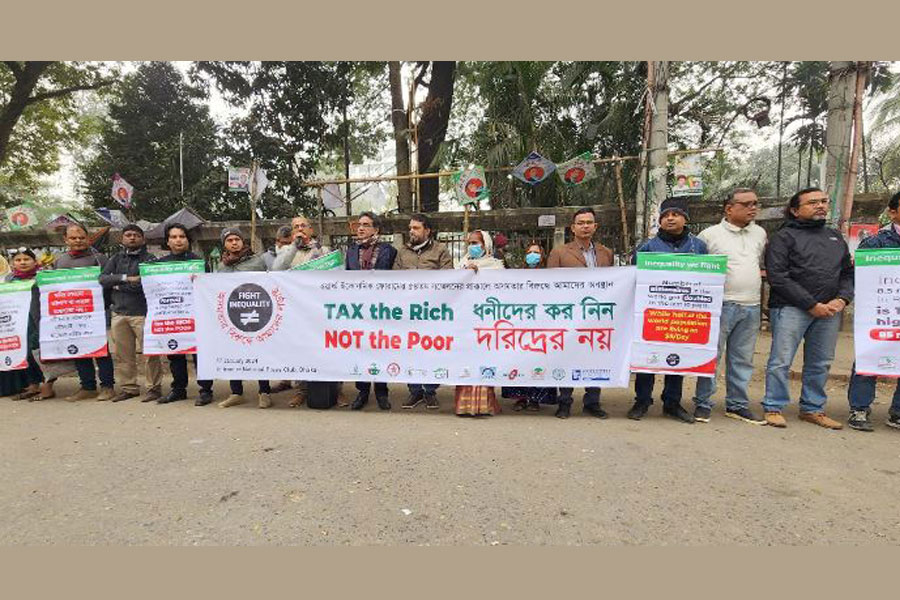
Published :
Updated :

Leaders of Civil Society Organisations (CSOs) on Wednesday demanded the necessity to abolish the regressive tax system to eliminate the severe income inequality that has been created among the people in different countries of the world, including Bangladesh.
The demand was from a rally organised by twelve civil society organisations led by Equity and Justice Working Group (EquityBD) in front of the National Press Club in the capital in solidarity with the global civil society network Fight Inequality Alliance on the eve of the 54th Conference of the World Economic Forum with the slogan "Tax the rich, not the poor".
Bangladesh Krishok Federation, Bangladesh Climate Journalists sorum, CPRD, Sundarbans and Coast Protection Movement, Online Knowledge Society, ASOD, Water Keeper Bangladesh, Trinamool Development Organization, CSRL, JSKS and Coast Foundation participated in the rally.
Mostafa Kamal Akand, Director of Coast Foundation, moderated the programme, while ASM Badrul Alam of Bangladesh Farmers Federation presided over the meeting.
Several recommendations were placed in the rally, including a balanced and fair tax system should be established through legislation and enforcement to prevent tax evasion.
Other recommendations included that research, investigation and other effective measures should be taken to prevent capital flight and profit repatriation. Besides, the tax burden on the poor and underprivileged should be eased by gradually reducing all types of indirect taxes, including VAT.
Motahar Hossain, on behalf of the Bangladesh Climate Journalist Forum, said that through indirect tax, basically, one person is forced to pay the tax of the other. Common consumers typically pay taxes levied on a company. This increases the cost of living for poor people.
On the other hand, the company that is making income is exempted from tax. This system needs to be changed, he added.
Syed Aminul Hoque, Secretary of EquityBD, said that the ongoing conference of the World Economic Forum (WEF), in fact, works for the multinational profiteering companies engaged in tax dodging and money laundering from poor countries.
"In this context, we need a global tax network under the UN framework where poor countries can protect themselves against tax dodging, and thus, money laundering will also be stopped. We expect our Prime Minister to convey this message while participating in the 54th Annual Conference of WEF," he said.
Imran Hossain of the CPRD said that tax evasion has become a normal practice in Bangladesh.
"We have laws and penalties for this, but they are not enforced. Emphasis should be placed on income tax and wealth tax collection to reduce indirect taxes," he said.
Nikhil Chandra Bhadra of the Sundarbans and Coast Protection Movement said that the people of Bangladesh fought the liberation war to abolish a discriminatory social system. But now, the disparity between the rich and the poor is the highest ever in the country’s history. This disparity can be reduced through an accountable and well-governed tax system.
Pradip Kumar Roy of Online Knowledge Society said that Bangladesh has often been praised for standing up for poor people and less developed countries at international conferences.
"We want Bangladesh to become the voice against discrimination and poverty alleviation in the upcoming conference of the World Economic Forum," he said.
In the closing speech, ASM Badrul Alam of the Bangladesh Krishok Federation said that all indirect taxes, including VAT, should be gradually reduced to ease the tax burden on the poor, and emphasis should be placed on bringing all industrialists and corporations under direct tax to increase the government's revenue.


 For all latest news, follow The Financial Express Google News channel.
For all latest news, follow The Financial Express Google News channel.